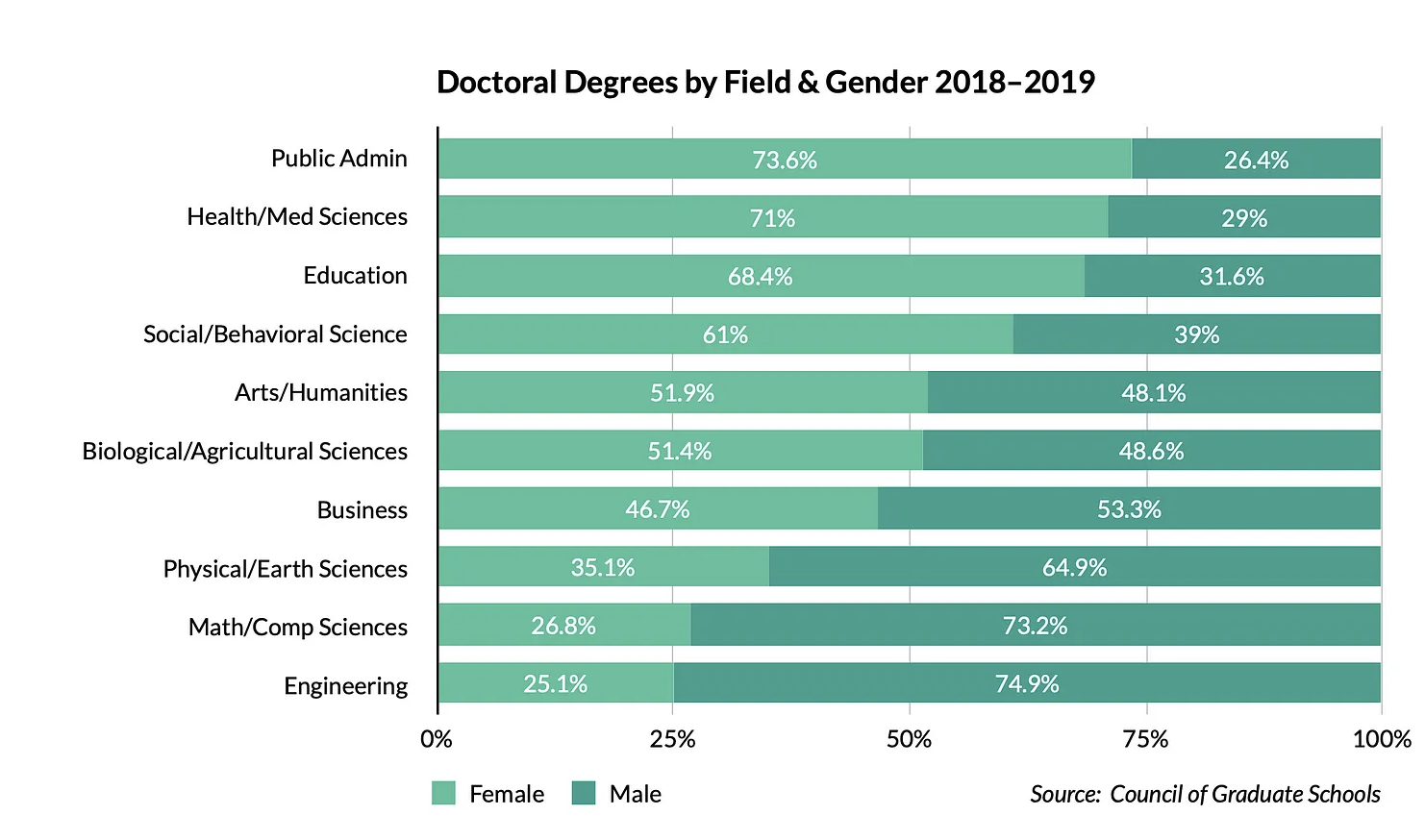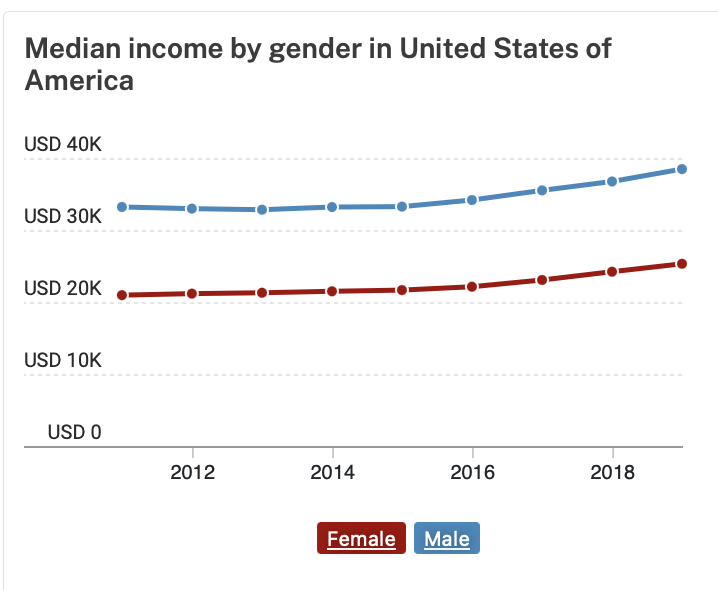In 2019, after writing 214 articles, Michael Shermer was booted out of Scientific American because the “science” magazine increasingly became scientific. One of the problems he noticed is that the editors were quick to criticize group disparities only when they ran in the woke direction. An excerpt from “Scientific American Goes Woke: A case study in how identity politics poisons science“:
[R]everse asymmetries never warrant explanations of reverse biases. To wit, this same study reported that “women earned 57%, 60% and 52% of all Bachelor’s, Master’s and Doctoral degrees respectively in the U.S. in 2013-14,” but proposed no reverse biases against men to account for such imbalances. Neither did a 2019 Council of Graduate Schools study that found for the 11th year in a row women earned a majority of doctoral degrees awarded at US universities (41,943 vs. 37,365, or 52.9% vs. 47.1%). Our attention is drawn to the lower percentages of female doctorates in engineering (25.1%), mathematics and computer sciences (26.8%), physical and earth sciences (35.1%), and business (46.7%), followed by discussions of systemic bias, but no such structural issues are on offer for the lower percentages of male doctorates in public administration (26.4%), health and medical sciences (29%), education (31.6%), social and behavioral sciences (39%), arts and humanities (48.1%), and biological sciences (48.6%). When the data is presented in a bar graph rank ordered from highest to lowest percentages for females earning doctorates (below), the claim that the fields in which women earn lower percentages than men can only be explained by misogyny and bias is gainsaid by the top bars where the valance is reversed, unless we are to believe that only in those bottom fields are faculty and administrators still bigoted against women whereas those in the top fields are enlightened.
About four years ago, Jordan Peterson illustrated another asymmetry, one for which many people only see one side of the equation. That’s the confirmation bias at work, once again.
The question addressed in this video is whether western culture is a “patriarchy.” Here’s the video [Update: the woman is Helen Lewis of British GQ – see first comment below for more on her. Here’s a link to the entire interview]. I made the following transcript:
Interviewer:
I mean, that’s the that’s my idea of the patriarchy, which is a system of male dominance of society.
Jordan Peterson:
But that’s not my sense of the patriarchy.
Interviewer:
So what’s yours?
Jordan Peterson:
Well, in what sense is our society male dominated?
Interviewer:
The fact that the vast majority of wealth is owned by men, the vast majority of capital and is owned by men, women do more unpaid labor
Jordan Peterson:
A tiny proportion of men. And a huge proportion of people who are seriously disaffected are men. Most people in prison are men. Who most people who are on the street are men. Most victims of violent crime are men. Most people commit suicide and men. Most people who die in wars are men. People who do worse in school are men. It’s like, where’s the dominance here precisely, what you’re doing is you’re taking a tiny substrata of hyper-successful men and using that to represent the entire structure of the Western society. There’s nothing about that that’s vaguely appropriate.
Interviewer:
And I could say equally one that most rape victims are women and terrible things happen to people of both sexes.
Jordan Peterson:
And you could say that with with perfect utility, but that doesn’t provide any evidence for the existence of a male dominated patriarchy. That just means the terrible things happen to both genders, which they certainly do.
Interviewer:
But there are almost no women who rape men, for example. So that is an asymmetry there in sexual violence.
Jordan Peterson:
Well, yes, there’s an asymmetry in all sorts of places. But that doesn’t mean that Western culture is a male-dominated patriarchy. The fact that there are asymmetries has nothing to do with your basic argument. You use this as a trope that people just accept: Western society’s a male dominated patriarchy. It’s like, No, it’s not. That’s not true. And even if it even if it has a patriarchal structure, to some degree, the fundamental basis of that structure is not power, its competence. That’s why our society works. It’s only when it’s when a structure degenerate into tyranny, that the fundamental relationships between people become dependent on power. It’s not power. If you hire a plumber, who’s likely to be male, it’s not because there are roving bands of tyrannical plumbers forcing you to make that choice. And it’s the case with almost every interaction that you have. At the face of our culture, you’re dealing with people who are offering a service of one form or another, who are usually part of the broad middle class and what you’re looking for is the person who can offer the best service. And you can find it. It’s not a consequence of being dominated by anything that’s tyrannical.
In other words, the category “men” includes some super-rich people. A huge portion of the group, however, is middle class and lower class men, almost all of whom are victims of the financial and political elites, just like most women are victims. According to this website, the median income of an American man is less than $40,000. If $40K is the median, that means a half of men make less than that. Such a modest income wouldn’t give a man meaningful financial clout over anyone else, male or female.
I often notice this problem of over-generalizing. I call it “categorization malpractice.” Someone begins a conversation by saying something like:
“Blacks are … ”
“Women are … ”
“Men do X … ”
“Doctors fail to Y … ”
This sloppy categorization inevitably causes arguments because the relevant category is almost never ALL Blacks, Women, Men or Doctors. I mourn for all of the hours lost and ink spilled by people who negligently over-categorize.




The interviewer is Helen Lewis of British GQ
Full interview:
https://www.youtube.com/watch?v=yZYQpge1W5s&t=0s
Here’s her article about doing the interview:
https://www.gq-magazine.co.uk/article/helen-lewis-jordan-peterson
Thank you for that information – I will update the article.